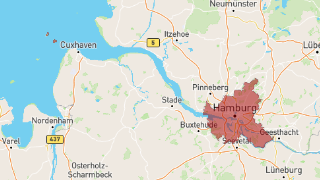Hamburg
Maps and statistics of Hamburg
Hamburg, officially known as the Free and Hanseatic City of Hamburg, is a major port city in northern Germany. It is the second-largest city in Germany, following Berlin, and is situated on the River Elbe. As a significant industrial hub, Hamburg boasts one of Europe's busiest ports, serving as a crucial point for international trade and logistics. It is also known for its maritime heritage, with the landmark Speicherstadt, a historic warehouse district and UNESCO World Heritage site, featuring stunning red-brick Gothic architecture.
The city is renowned for its vibrant cultural scene, hosting numerous theaters, museums, and music venues, such as the renowned Elbphilharmonie concert hall. St. Michael's Church, the Reeperbahn entertainment district, and the Miniatur Wunderland model railway exhibit are popular attractions. Hamburg is a city of bridges, with more than those in Venice or Amsterdam, adding to its charm.
Renowned for its green spaces, Hamburg has beautiful parks including Planten un Blomen. Its unique blend of history, culture, and modernity makes Hamburg a fascinating place to explore.
| Population | 1,892,122 |
|---|---|
| Area | 752.678 km2 |
